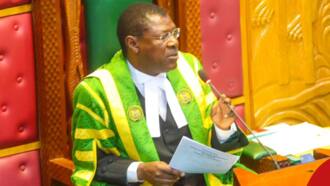President William Ruto succumbed to pressure from Gen Z protesters and declined to approve the controversial Finance Bill 2024, leaving some Kenyans with many questions about what his decision means.
1. What are the implications of the rejection and loss of the entire Finance Bill, 2024?
We are guided that the rejection and loss of the entire Finance Bil, 2024 shall occasion a financing gap of approximately KSh 300 billion between the expenditure approved by the National Assembly through the Appropriation Bil, 2024 and the projected revenues that may be raised from the existing tax measures.
The next Financial Year shall commence in the next four days, being Ist July 2024. The instrument that authorizes the withdrawal of monies from the Consolidated Fund for utilization by the national government is the Appropriation Bill, which is distinct from the Finance Bill.

Read also
ODM Party to Initiate Process of Recalling 7 MPs Who Voted for Finance Bill: “Sided with Opressor”
Notably, the House has already passed the Appropriation Bil, 2024. We are guided because the financing gap may be bridged by reducing approved expenditures. This may be achieved by enacting a Supplementary Appropriation Bill under the applicable procedure.
2. What has the president’s memorandum recommended to the National Assembly in respect of Finance Bill 2024?
The President’s Memorandum has referred the Finance Bill 2024 back to the National Assembly for reconsideration with reservations recommending the deletion of all 69 clauses of the Bill.
PAY ATTENTION: Share your outstanding story with our editors! Please reach us through news@tuko.co.ke or WhatsApp: 0732482690.
3. What is the effect of the President’s memorandum on the bill, and can the bill be revived?
The President’s Memorandum constitutes a rejection of the bill in its entirety. The effect is that the entire Bill will be lost upon approval of the President’s reservations and recommendations by the National Assembly.
Any Member intending to negate the President’s reservations/veto or revive any of the sixty-nine (69) Clauses of the Bill is required to marshal the votes of at least two-thirds of the Members of the National Assembly, being 233 Members.
This is in keeping with the provisions of Article |15(4)(a) of the Constitution.
4. What is the next course of action?
Upon receipt of the President’s Memorandum, the Speaker of the National Assembly is required to refer it to the Departmental Committee on Finance and National Planning. I have referred the Memorandum to the Committee for consideration and reporting to the National Assembly when it next sits.
In the event the Committee fails to report to the House at its next sitting, the House shall proceed and consider the Memorandum at Committee of the Whole House upon resumption from recess.
What should guide the committee and the house in considering the president’s memorandum?

Read also
William Ruto Signs Appropriations Bill 2024, Orders Treasury to Give Estimates to Reduce Expenditure
The President’s Memorandum recommending deletion of all clauses of the Bil notes that it is informed by the need to reflect the voice of the people of Kenya who have rejected the Bill in its entirety. The Committee and the House shall take this justification into account in their deliberations.
5. Will the National Assembly be recalled to consider the president’s memorandum?
Standing Order 42(3) of the National Assembly Standing Orders requires the Speaker to transmit to every Member any Message received from the President at a time when the House is not in session and to report the Message to the House on the day it next sits.
The National Assembly altered its Calendar and proceeded for a short recess on Wednesday, 26th June 2024. The House is scheduled to resume its regular sittings on Tuesday, July 23, 2024. The Departmental Committee on Finance and National Planning shall be required to report to the House on the President’s Memorandum on this day.
6. Is there a precedent of the president’s rejecting an entire bill?
Yes. It is not unusual for the President to refer a Bill back with reservations recommending its rejection through deletion of all its Clauses. The National Assembly has previously received and considered the President’s reservations recommending the deletion of all clauses in a bill during the 11 and 12th Parliaments.
In particular, the House received and considered reservations relating to the Central Bank (Amendment) Bill (National Assembly Bil No. 28 of 2 0 1 4) and the Law of Contract (Amendment) Bill (National Assembly Bill No. of 2019). In both instances, the House failed to marshal the votes of two-thirds of the National Assembly members required to veto the President’s recommendations.
7. What is the link between the budget, the Finance Bill and the Appropriation Bill?
The Budget for any financial year comprises Estimates of Expenditures for the national government. The approved estimates are translated into an Appropriation Bill for consideration and passage by the National Assembly.

Read also
Kenyan Newspapers, June 27: Defiant Gen Zs Vow to Go on with Protests Despite Ruto’s Concession
Documents supporting the Budget also contain projections of revenue, loans, and grants required to finance the Budget for a Financial Year.
The revenue projections are derived from existing tax measures and proposed revenue-raising measures through new or additional taxation. Any new or additional taxation measures and any variation to existing tax measures are introduced through a finance bill.
The Finance Bill is a piece of legislation that largely consolidates the various proposed taxation measures intended to raise additional revenue to support the budget.
It may lead to an increase or reduction of taxes. The various revenue-raising measures in a Finance Bill are costed and, therefore, constitute part of the Estimates of Revenue.
Source: TUKO.co.ke

